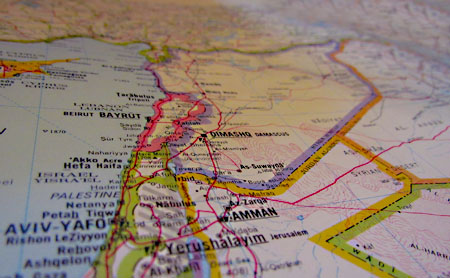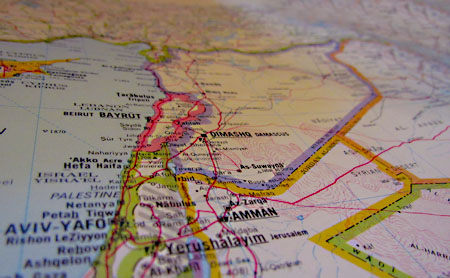
This is today’s omnibus Syria post.
First, I have a question. I keep hearing people talk about how hard it will be to verify that Bashar al-Assad has really given up all his chemical weapons under the agreement reached this weekend with the Russians. Fair enough. It will be hard. But then I keep hearing about how this will be “just like Saddam” and the way he tricked the UN inspectors. What am I missing here? Han Blix’s team certainly had issues with Saddam’s level of cooperation, but in the end there was no trickery. It’s just that Saddam had no  weapons. That’s why it was hard to get a full accounting from him.
weapons. That’s why it was hard to get a full accounting from him.
Right? So what is all this renewed Saddam talk about? Are the hawks just hoping that we’ve all forgotten there was no WMD to find in the first place?
Second, I am amused to see John McCain griping that this agreement will be viewed as “an act of provocative weakness on America’s part.” This got me wondering. Has there ever been any American action overseas short of a full-on invasion that McCain hasn’t viewed as an act of provocative weakness? I can’t think of any, but I suppose there must have been at least one or two. Somebody help me out here.
Third, I am eagerly waiting for some plugged-in White House reporter to write a definitive tick-tock about the whole Syria thing. The beginning of the story is pretty well known. I don’t think there’s much question that President Obama initially failed to grasp the level of opposition to his plan for air strikes, and that this forced him into a series of clumsy reverses and foolish statements. It was a pretty embarrassing fubar.
But despite the endless petulance from the usual suspects, the past two weeks have been different. By hook or by crook, Obama (a) raised the issue of Assad’s chemical weapons to an international level, (b) got Vladimir Putin (!) to take a lead role in reining them in, (c) got Assad to join the chemical weapons ban and agree to give up his stockpiles, and (d) do it all while keeping military pressure as an active option, but without ever firing a shot. Carrying out the inspections and destruction of Assad’s weapons will obviously be a Herculean task, but still, this is a good start.
So here’s what I want to know: was this all just a lucky accident? I’ve heard a couple of rumors lately that John Kerry’s “off the cuff” remark about Assad giving up his chemical weapons wasn’t unintended at all. In fact, he was authorized by the White House to bring it up when an opportunity presented itself, and that opportunity came last Monday. Kerry’s actual choice of words may have been a little awkward, but it was no accident. Putin expected it; Kerry knew what he was doing; Lavrov called to coordinate a few hours afterward; and the Russians then made their proposal. But this has all been kept under strict lock and key because the whole point was to make this a Putin initiative, one that he’d have ownership of. If it’s his baby, he’ll fight for it instead of coming up with endless reasons to nitpick an American proposal to death.
Is this how things went down? I have no idea. But I’d sure like to find out. If it’s true, it would be one of the most fascinating pieces of diplomatic legerdemain in recent years. And it would demonstrate an almost unheard-of willingness in a U.S. president to accept mountains of abuse because secrecy was essential to getting the job done.
So: crackpot rumor or actual fact? Someone with good White House sources needs to figure this out.








